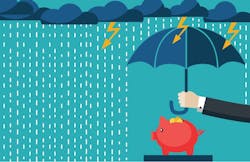As I sit here writing this column in early Spring, I realize that things in the collision repair industry, let alone the world, could drastically change by the time this goes to print and you are reading it.
Regardless of what happens in the time between then and now, I think the important lesson is that unexpected events happen to our industry, our economy, and our country without notice. The obvious big ones that have taken place in the time I’ve been in the industry are 9/11, the 2008 housing crisis, and, now, the coronavirus.
I admit, the timing of this may not be the best, as some of what is discussed here in this column won’t be helpful in the current situation. However, one thing we know is that history is doomed to repeat itself. That’s why I would make the argument that this is the best time to discuss how to be prepared for the unexpected.
There are some basic principles that can be a great benefit to a company, regardless of the reason for the sudden change in market conditions. These principles, if enacted, can put companies in position to be healthy enough to offer the best chances of survival no matter what comes their way.
And when this COVID-19 pandemic is finally over, the companies that had these in place will likely be standing stronger than their competitors.
I’m sure at some point in your life you’ve known someone who has received some unexpected and scary health news from a doctor. In most cases, the person commits to eating healthier and exercising regularly. Inevitably, the patient usually states that they wish they had lived like that before the initial doctor visit as 1) they might have avoided the visit altogether and, 2) they feel so much better living healthy.
Running a business is no different. We must consistently make decisions that keep the company healthy in order to be best prepared for unexpected events.
The first principle is to have a solid savings account. A good formula to use is to see how long you could last if you didn’t generate a single dollar in sales, yet had to make all your essential overhead expenses. I suggest having a minimum of 3 months expenses in savings that would allow you to cover all those overhead expenses. If that seems impossible, see how long it takes you to find a recent purchase you regret making. Sixty percent of the country lives paycheck to paycheck. Professional athletes earning millions go bankrupt regularly. We don’t have an earning problem in America—we have a spending problem. Our industry is not immune to this problem. One of the best pieces of advice I’ve ever been given is quite simple: Don’t buy what you can’t afford to pay for in full.
Another principle that makes a world of difference is having no, or very little, debt. Debt is the norm in America. Yet I believe that is precisely why we live paycheck to paycheck. We live in a society where the norm is to buy whatever we want, whenever we want it, and let someone else pay for it up front. We can’t run our business that way. If someone gave me $300,000 to spend on equipment in our shop, I could spend that money in a couple hours. But then I’d end up paying $400,000 over the next 5-10 years for those purchases. Instead, we follow principle No. 1 and have a nice savings account built up, so we can pay for equipment in full when we know it’s the right time to buy.
The third principle is having an efficient team and system of processes in place that allows them to maximize their efficiency. I’ve talked with several shop owners of the last few weeks who have discussed the layoffs they’ve made. Almost every one of them has mentioned that, when the dust settles, they won’t be bringing everyone back because they were improperly staffed before the crisis started. We all know when we buy something that it has to give us a return on investment. Payroll is our largest investment so we must track the KPIs that ensure a consistent solid return.
I know these principles won’t help you out of the current situation you find yourself in. But if they make sense and you agree that the principles would have put you in a better position to withstand this current climate in our industry/world, then you can make this your game plan on what to focus on when you come out of it. Following these three principles—keeping a healthy savings account, running your company with zero or little debt, and always maintaining a staff size that allows you a consistent return—will put your company in position to weather the unexpected storms.



